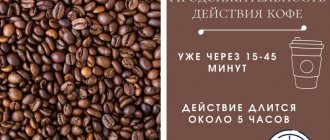How much coffee can you drink per day? How to drink coffee to perk up? Let's figure it out together with a nutritional coach.
Coffee is such a popular drink that adults drink an average of 550 cups of coffee per year. But there is so much controversy surrounding it that it is difficult to know what to believe. There is a real story about a barista who drank 19 cups of coffee on a dare and has been suffering from the consequences for more than 15 years. What we mean is that moderation is important in everything.
Olga Ivanova
trainer-nutritionist
The drink increases the heart rate, loading the heart muscle and dilating blood vessels.
Coffee can be beneficial. The main thing is to choose it correctly
What happens to the body if you don’t drink coffee for a week?
When to drink coffee to perk up?
Australian scientists have resolved the eternal controversy surrounding how to drink coffee correctly. Participants in the experiment were asked to drink 1-2 cups of coffee (containing approximately 200 mg of caffeine) before a 30-minute nap at 3:30 am. After waking up, experts observed the volunteers for 45 minutes. The results were positive: subjects showed improvements in performance and alertness. Researchers have concluded that it is best to drink coffee not in the morning, as many do, but before bed. In their opinion, such an algorithm and the amount of caffeine will allow you to squeeze the maximum benefit out of the drink.
Photo: istockphoto.com
Olga:
It is best to drink natural coffee, insoluble, but no more than two cups a day. This, in turn, removes fluid from the body. Therefore, you need to drink a glass of water with coffee to replenish the balance.
What are the dangers of drinking too much of a tonic drink?
Daily consumption of caffeine in amounts of more than 300 milligrams provokes a nervous and anxious state, the so-called caffeine agitation. The person becomes irritable and often suffers from insomnia. In some cases, digestive problems occur.
In addition, caffeine has a diuretic effect. If it enters the human body in increased quantities, it can lead to dehydration. However, studies have shown that drinking too much of the drink usually does not increase the need for additional fluid. This is explained by the fact that the human body gradually adapts and adapts to it.
How much coffee can you drink?
Coffee contains hundreds of biologically active compounds, and caffeine is one of them. Its content per cup fluctuates around 100 mg. Coffee lovers drink an average of 5-6 cups a day (about 400-500 mg of caffeine), while others limit themselves to one serving. Who is right? Researchers agree that 400 mg of caffeine (four cups) per day is safe for the body, and a single serving should not exceed 200 mg. The content of this substance in a cup of drink depends on its type and brewing method (approximate values):
- espresso (70-80 ml) - 120-200 mg;
- Americano (120 ml) - 85-120 mg;
- cappuccino (200 ml) - 100-136 mg;
- latte (400 ml) – 200-360 mg;
- instant coffee (200 ml) - 62-96 mg;
- Turkish coffee (200 ml) - 76-130 mg;
- coffee from a drip coffee maker (200 ml) - 145 mg.
Photo: istockphoto.com
If you exceed the safe daily intake of caffeine, you may experience restlessness, anxiety, insomnia, upset stomach, dizziness, and irritability. But in general, caffeine affects everyone differently - it depends on the body's sensitivity to this substance. Some people can drink coffee and fall asleep immediately, while others stay awake all night.
Individual characteristics also matter: people with panic disorder, arrhythmia, high blood pressure, and diabetes are not advisable to drink a lot of coffee. Scientists also recommend that pregnant women limit their consumption to 100-200 mg of caffeine per day - about 1-2 cups of coffee. But do not forget that only a doctor can indicate a safe dose of the drink specifically for you.
Extra energy? How does coffee affect your workout performance?
Coffee will work more effectively if you drink it correctly
How to reduce the amount of caffeine?
Another way to reduce the dose of caffeine consumed is to reduce the amount of caffeine in the drink. The content of this substance varies depending on the type of coffee. For example, in Arabica it is 30% less than in Robusta.
The amount of caffeine in a cup of coffee may also vary depending on the degree of roasting of the beans or the brewing method.
It is recommended to resort to some tricks when brewing. To ensure that as little caffeine as possible gets into the drink, it is recommended to reduce its preparation time to a minimum. To do this, the ground grains are poured not with cold, but with hot water (preferably boiling water). Then the drink should be brought to a boil and immediately removed from the heat, after which all that remains is to strain it and pour into cups.
Attention! The absorption of caffeine by the human body depends on the presence of sugar, milk and other ingredients in the drink. For example, espresso contains a small amount of water, so it is digested faster than a latte, an Americano with milk or a cappuccino. Therefore, the negative effect of this drink on the body will be more aggressive.
Can I drink coffee before or after training?
It is better to drink coffee before class. At the same time, it is important to replenish your water balance: with a cup of drink you need to drink one glass of clean water. It is not advisable to drink coffee afterwards.
Photo: unsplash.com/@nixcreative
Olga:
If you want to lose weight, you need to control the volume of coffee, especially cappuccino, latte and raffa. Such drinks contain additional fats (milk, cream, syrup, sugar) - the calorie content in this case reaches 350 kcal per cup.
Which powder to choose: ground or instant?
The most useful is ground coffee. Soluble is inferior to it in terms of taste and strength of aroma, and most importantly - in terms of usefulness. Its composition is devoid of many substances found in coffee beans. All that remains after processing the raw materials is pure caffeine.
Today on store shelves you can see coffee without this substance. But such a drink is not as safe as it seems. Removing caffeine is impossible without the use of natural solvents, which, when released into an already brewed drink, form chemical compounds hazardous to health. Some of them can cause cancer of the human digestive system.
Therefore, doctors recommend reducing caffeine levels in other ways. Otherwise, it is better to completely avoid drinking the tonic drink.
What can you eat in preparation for a colonoscopy?
During preparation for the procedure, you need to eat in a balanced, varied and fractional manner. The frequency of meals should be at least 5 times, in small portions. This regime must be introduced in advance, no later than 3 days. If there are any diseases of the digestive tract, this period may increase to one week. The diet menu for colonoscopy may include:
Allowed to eat:
- Low-fat fermented milk products, cheese, sour cream, butter, yogurt without additives or fillers
- Eggs
- Lean meat, poultry and fish (boiled, steamed or stewed)
- Well-cooked white rice (except pilaf)
- Sugar, honey (not in honeycombs)
- Broths (clear, strained)
- Dietary meat or fish. It is recommended to give preference to chicken, turkey and beef. For better absorption, they should be cooked in the form of cutlets or meatballs.
- Eggs and dairy products with a small percentage of liquid
- Yoghurts (regular and drinking) without food additives.
- Semolina.
Allowed to drink:
- Weak tea
- juices (without pulp, if freshly squeezed, then diluted and strained).
- Unlimited water
- Non-alcoholic, non-carbonated, uncolored drinks
- Jelly, honey.
Allowed foods must not contain small seeds, grains, seeds, bran.
The diet to prepare for a colonoscopy must include sufficient daily fluid intake. The minimum volume of liquid drunk should be at least 1.5-2 liters (in the absence of relevant contraindications).
How to prepare properly:
Knowing what you can eat before a colonoscopy can provide better information. As a rule, start a diet
required
three days before the procedure
. Its essence is to rid the body of intestinal contents (discussed by many: toxins and toxic substances, disposal of harmful gas-forming products, dietary fiber, feces) and coloring substances that can distort the color of the mucous membrane, the image. In addition, a slag-free diet helps normalize stool, preventing the development of constipation, diarrhea, bloating and the formation of large feces that make it difficult to pass through the endoscope.
This medical procedure may be accompanied by discomfort in the lower abdomen due to excessive “bloating” with air, which is introduced through the endoscope, if there is “excess content” in the lumen. But maintaining the recommended diet before a colonoscopy can reduce discomfort by improving preparation without obstructing the view of the camera and the endoscope. If you suffer from constipation, you will need to talk to your doctor, who may prescribe a course of daily laxatives.
What foods should you not eat?
It is prohibited to use:
- Bakery, flour and pasta products
- Vegetables, including cabbage, potatoes, herbs, mushrooms, seaweed, spices
- Cereals, cereals, legumes, cereals, nuts, seeds, sesame, poppy seeds, grains, bran and other seeds
- Tough meat with cartilage, canned food, sausages, sausages, seafood
- Fruits, berries, including dried fruits, preserves, jam, marmalade, jelly
- Chips, hamburgers, chocolate
- Peppers, radishes, broccoli, cabbage, radishes, onions, garlic, etc.
- Some cereals (even water-based): wheat, corn and oatmeal.
- Greens (especially spinach and sorrel).
- Fruits: nectarines, apricot, orange, pineapple, some varieties of apples, etc. The presence of fructose in them activates prolonged and harmful fermentation.
- Milk porridges made from any type of cereal.
- Beans. The diet in preparation for intestinal colonoscopy must exclude the consumption of beans, peas, lentils and other legumes that cause excessive gas formation.
- Berries with a high concentration of pectin (both fresh and frozen): raspberries, gooseberries, etc.
- Flour products (including sweets and brown bread). They require a lot of time and enzymes to digest. They can also cause stool retention.
- Mushrooms, nuts, milk, coconut and products that contain crushed grains.
- Any foods that can change the color of stool: beets, dishes containing cuttlefish ink, etc. (black pigment)
- IT IS STRICTLY PROHIBITED TO EAT TOMATOES 3 DAYS BEFORE
Any other products not included in the approved list
Prohibited to drink:
- Alcohol
- Carbonated drinks (even sparkling water)
- Kvass
- Coffee
- Compote
- Kissel
Restrictions for pregnant women and children
Women who are expecting a child should be especially careful about drinking coffee. Studies have shown that drinking more than four cups during the day can lead to fetal death. This is also fraught with disturbances in the development of the baby after his birth.
A safe dose is considered to be 100 milligrams of caffeine per day. In this case, it is necessary to take into account the doctor’s recommendations and indicators of the woman’s general health, her age, activity level and diet.
Attention! During pregnancy, it is not recommended to drink coffee if the woman’s menu includes products containing caffeine, as well as with high blood pressure and toxicosis. To replenish calcium in the body, milk should be added.
Children can drink a tonic drink from the age of 14. The permissible number of cups drunk is one or two per day. It is recommended to add milk or cream. After drinking the drink, you should monitor the teenager’s condition. If adverse effects occur, you should completely stop drinking coffee or reduce the number of servings.
How to prepare the intestines for a colonoscopy?
Experts recommend starting in advance: going on a low-fiber diet 2-3 days before, and taking an enema the day before and a couple of hours before the procedure. This method is contraindicated for a large number of people (for example, if they have hemorrhoids), and many are simply uncomfortable doing an enema on their own. Therefore, there are now special laxatives that simplify preparation. These include Moviprep, an innovative drug for cleansing the intestines before examinations and operations. Its difference is in convenience - only 2 liters of solution instead of 4 will help prepare the intestines for the procedure. If your doctor's appointment is in the morning, drink 1 liter the night before and in the morning. If the test is scheduled for the afternoon, you can prepare for it on the same day by drinking 2 liters of solution in the morning.
Effect on the cardiovascular system
Simultaneously with the stimulation of the nervous system, large doses of caffeine negatively affect the functioning of the heart. For this reason, doctors advise patients with hypertension, myocardial ischemia and other cardiac pathologies to refrain from taking tonic drinks.
An increase in blood pressure occurs under the influence of an alkaloid, and this is proven by multiple studies. And the heart begins to beat faster. The impact on its conduction system in case of overdose can provoke the appearance of life-threatening arrhythmia - atrial fibrillation. There have been many cases of young people admitted to hospital in serious condition after taking too much energy drink.











